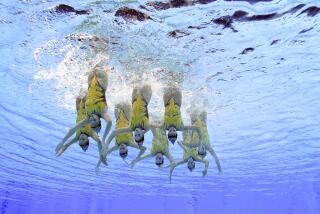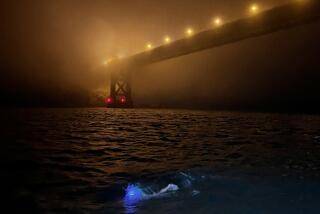One to Remember : Lynne Cox Back Home, Warmed by Russian Friendliness After a Cold Swim
- Share via
She will remember the “majestic mountains,” and--of course--the “spectacular blue lakes that change with the weather,” Lynne Cox said Wednesday.
But Cox also will never forget the surge of emotion that she felt as thousands of Russians--children and adults--threw flower bouquets from the shores of Lake Baikal in Eastern Siberia as she swam past them on her way to make history.
Barely inside her Los Alamitos home after arriving Wednesday afternoon at Los Angeles International Airport, Cox was still being interviewed about what it all meant.
Always the trouper, the 31-year-old swimmer graciously answered questions about last week’s goodwill swim as her parents fidgeted and waited to get a word or two with their daughter--whom they watched on television from across the world.
“One of the major reasons for this (swim) was the people-to-people diplomacy,” Cox said during a telephone interview from her home. “I will never forget being in this village . . . and a woman came up to me and she was great.” She giggled almost self-consciously.
“She said--not these exact words, but basically--’I am speaking on behalf of myself, but also on behalf of many Soviet people. We believe in friendship and peace with the United States and we want to see that happen. Can you please tell the American people that there are people here that feel that way.’ ”
“There was a crowd around (the Soviet woman) listening in, nodding, then a child asked me for an autograph, then pretty soon there are 150 people around us.”
Cox giggled again. “I haven’t learned the words yet to describe it, but it was wonderful. . . . I felt that I was being accepted there as an American, as was our team. And if different people can start working together through the field of medicine or sports or trade, it will help create some real positive changes (between the Soviet Union and America).”
For now, though, Cox said she just needs to rest and “regroup” and decide whether similar endurance swims are in her future. She intends to meet with a New York agent soon about writing a book on the experience, but she had barely caught her breath Wednesday.
Five hours earlier, the cheery athlete had been met at Los Angeles International Airport by about 15 relatives, friends and city officials who waved tiny American flags beside a banner that read: “The City of Los Alamitos Welcomes Lynn Cox, All-American Swimmer.”
Earlier this week, the Lynne Cox love-in spread west from Lake Baikal to Moscow, where she returned after completing her swim.
She had yet another press conference and a meeting with U.S. Ambassador Jack Matlock and his wife at their residence before starting home via Frankfurt Tuesday night.
Earlier, before an all-day journey here, there was a private meeting with the mayor of Irkutsk, the major city in the Baikal region.
Apparently, her visit not only has achieved its purpose of cementing some grass-roots friendships but inspired some entreprenurial ideas among her hosts.
In relation to Cox’s home state, Siberia is 16 hours ahead and 50 years behind. Phone service is primitive, and there isn’t a burrito within 4,000 miles.
Opportunity for Change
But some Siberians see an opportunity to change all that and attract American tourists by making the most of Cox’s goodwill tour.
Ross Roseman, an Alaska Airlines pilot from Seattle, was Cox’s navigator and paddled a board alongside her all the way. Afterward, when some government officials in Irkutsk learned what Roseman does for a living, they pounced on him and spent two days persuading him to approach his employers about starting direct service from Anchorage to Irkutsk, cutting the normal travel time in half.
Also, on the day after Cox’s swim, local Soviet Sports Committee officials took Cox and her party on a boat ride up the lake and stopped at a lakeside meadow for a picnic.
After a while, when everyone was mellow from picking mushrooms and downing vodka--Cox took only a courtesy sip--Soviet journalist Yevgeni G. Gringaut commandeered Cox and her interpreter and steered them away from an American reporter with whom they were standing.
Gringaut’s proposal, apparently on behalf of local officials, was for Cox to return to Baikal in March when the lake is frozen for a two-mile swim across the icy Angara River that flows out of the lake.
“The temperature is 4 to 6 degrees (centigrade, 38 to 43 Fahrenheit),” Gringaut said--conditions and distance similar to her Bering Strait swim last year.
The Soviets indicated that they would like to use Cox’s name to develop a tourist complex, aside from the government Intourist hotel where her party stayed in the village of Listvyanka at the lake. They also would like for her to solicit American capital for the project.
Evidently, there is a little capitalist in every Communist.
Cox told the Soviets that she would think about it.
Privately, she said: “It would just be a stunt. I have other things to do now.”
Gringaut, editor of Olympic Panorama Magazine in Moscow, was the most persistent of Soviet journalists. He seldom missed a chance to aim one of his cameras at Cox or overpower a press conference with his booming voice.
But what really bothered Cox and her group was an incident on their last night at Listvyanka, when they were strolling down to the lake to be by themselves one last time and Gringaut showed up in a car, asking for a group shot.
Although the Americans lined up, Gringaut realized they weren’t pleased at the intrusion and backed off, noting: “If this is a team meeting, why are the two interpreters from the (Soviet) Sports Committee here?”
His reference was to Katya Rozhdestvenskaya and Elena Mineeva, whom the Sports Committee assigned to Cox’s group during their 12 days in the country.
The young women were with the group constantly and became close friends, which was the point of Cox’s visit.
Reflections on a Siberian odyssey:
Cox cut short training and advanced her swim by two days, from Sunday to Friday, because of a forecast of bad weather. As it turned out, Sunday was calm and appeared all right for swimming, but that day also was cooler.
She had bright sun Friday to warm the water surface to as high as 56 degrees; Sunday morning, on the other hand, was partially overcast.
“It made a lot of difference,” she said. “The water was real cold underneath and would have been colder on top.”
She didn’t second-guess her choice of courses, either. In strict terms, she didn’t swim across the world’s deepest lake but across the top of the bay leading to the Angara River--a straight-line distance of seven miles, although she swam about 10 in circling around the current rushing to the Angara. The shortest distance across the lake would have been about 25 miles--too formidable even for her, considering the water temperature, unless she went to the south end.
“I was still thinking about it when we were looking at the charts after we got there,” she said. “But (the Soviet trawler) captain said there were storms down at that end, and anyplace else would be going from wilderness to wilderness.
“The main idea was the people-to-people diplomacy. If I finished in the wilderness, there wouldn’t be any people.”
Could Have Gone Farther
So she swam to Listvyanka, where the enthusiastic reception by about 3,000 people was beyond her dreams.
She said she could have swum farther and longer than the 4 hours, 19 minutes, 18 seconds.
The most unpleasant part of the effort for Cox was entering an ambulance afterward so that she could be checked for hypothermia and to allow Soviet Dr. Georgy Gurbin to draw a blood sample to compare it with one taken minutes before she started.
“I really didn’t like going into the ambulance,” she said. “It doesn’t look too good. And then when Georgy was trying to take that blood--I really didn’t want to do that.
“He was jabbing away at one finger and wasn’t getting anything, even squeezing like mad, because my hands were so cold that the blood vessels were constricted. So he tried another finger and finally got something.” 0 Cox’s closest brush with disaster was Sunday evening when she went swimming with Roseman in the lake, well before dark.
A motorboat almost ran them down, veering away at the last instant.
“It was real serious,” Cox said. “He was just going full blast and didn’t see us until he was 20 feet away. He yelled something in Russian when he went by.”
Roseman thought it was no accidental near-miss, although the boater probably didn’t know the swimmers were Americans.
“I could tell he saw us,” Roseman said. “He did it on purpose.”
More to Read
Sign up for The Wild
We’ll help you find the best places to hike, bike and run, as well as the perfect silent spots for meditation and yoga.
You may occasionally receive promotional content from the Los Angeles Times.






